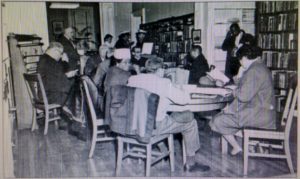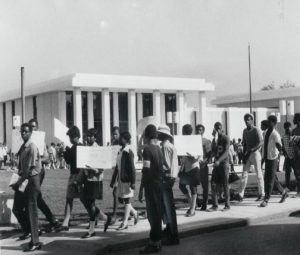 The residence at 137 South Sycamore Street that once served as Petersburg’s public library was built c. 1859 by John Dodson, the first mayor of Petersburg directly elected. He was the mayor from 1851-52. Major General “Billy” Mahone also lived in this home. He entertained General Robert E. Lee here when Lee was in the city for the wedding of his son Brigadier General William Henry Fitzhugh (Rooney) Lee to Miss Mary Tabb Bolling at St. Paul’s Episcopal Church in November 1867. Mr. William McKenney subsequently purchased this home, and in 1923, his daughter, Clara McKenney, donated the property to the city to be the new public library. The deed stated that the first floor was for whites and the basement was for “colored persons”. In April 1925, the colored branch of the Petersburg Public Library opened in this building.
The residence at 137 South Sycamore Street that once served as Petersburg’s public library was built c. 1859 by John Dodson, the first mayor of Petersburg directly elected. He was the mayor from 1851-52. Major General “Billy” Mahone also lived in this home. He entertained General Robert E. Lee here when Lee was in the city for the wedding of his son Brigadier General William Henry Fitzhugh (Rooney) Lee to Miss Mary Tabb Bolling at St. Paul’s Episcopal Church in November 1867. Mr. William McKenney subsequently purchased this home, and in 1923, his daughter, Clara McKenney, donated the property to the city to be the new public library. The deed stated that the first floor was for whites and the basement was for “colored persons”. In April 1925, the colored branch of the Petersburg Public Library opened in this building.
On February 1, 1960, four North Carolina Agricultural and Technical (NC A&T) College students sat down  at the Greensboro, North Carolina Woolworth’s “whites-only” lunch counter. After the store refused to serve them lunch, similar sit-ins and protests spread throughout the south. Petersburg was no exception. On February 23, 1960, fifteen to twenty black students sat down at the lunch counter at S.S. Kresge Company. Smaller groups of students, primarily from Peabody High School, sat down at the white’s only lunch counters at McClellan’s and the W.T. Grant Company. In Petersburg at that time, African-Americans could order from lunch counters but were not permitted to sit down and obtain service. All three of these establishments closed their lunch counters that day. This was the opening salvo of the Civil Rights Movement in Petersburg.
at the Greensboro, North Carolina Woolworth’s “whites-only” lunch counter. After the store refused to serve them lunch, similar sit-ins and protests spread throughout the south. Petersburg was no exception. On February 23, 1960, fifteen to twenty black students sat down at the lunch counter at S.S. Kresge Company. Smaller groups of students, primarily from Peabody High School, sat down at the white’s only lunch counters at McClellan’s and the W.T. Grant Company. In Petersburg at that time, African-Americans could order from lunch counters but were not permitted to sit down and obtain service. All three of these establishments closed their lunch counters that day. This was the opening salvo of the Civil Rights Movement in Petersburg.
On February 27, this movement galvanized around ending segregation in the Petersburg Public Library. Under the leadership of Reverend Wyatt Tee Walker, pastor of Gillfield Baptist Church, approximately 140 African-American students from Peabody and Virginia State College walked in the main entrance and took all the available seats inside. Library access for African-Americans at that time was through a side entrance that led only to the colored branch in the basement. The library was closed for the next four days, and the city council passed a tougher ordinance to deter trespassing and refused to integrate the library.
On March 7, 15 blacks walked through the front door of the library and took seats inside reserved for whites. Eleven were arrested and under the new city ordinance, each faced up to a year in jail and a fine of up to $1,000. Five remained in jail for more than forty hours. On the night of March 8, approximately 200 people participated in a prayer vigil on the steps of the Petersburg Hustings Courthouse.
Following the library sit-ins, demonstrations took place at the Blue Bird and Century Theaters, Spiro’s Department Store, and The Trailways Bus Station, among other locales. The library was closed from July 6 to November 11. However, by the end of 1960, the protests by African-Americans in Petersburg resulted in the opening of all lunch counters, the public library, and numerous other business and government offices to all Petersburg citizens regardless of color.
Dr. Walker provided leadership to many civil rights organizations in Petersburg. Later in 1960, he left the city to serve as the chief of staff for Dr. Martin Luther King, Jr., and as the executive director of the Southern Christian Leadership Conference. He was arrested seventeen times for his actions to bring full civil rights to African-Americans.
Sources:
- Amina Luqman-Dawson’s African-Americans In Petersburg
- Crocker, Presentation Notes From 10/7/10
- National Register Of Historic Places, Inventory-Nomination Form, Poplar Lawn Historic District
- Scott, Petersburg’s Story